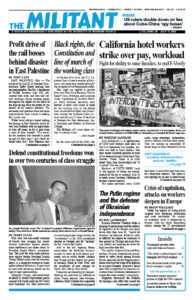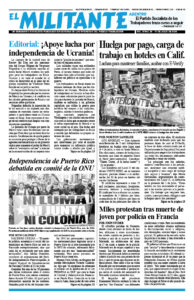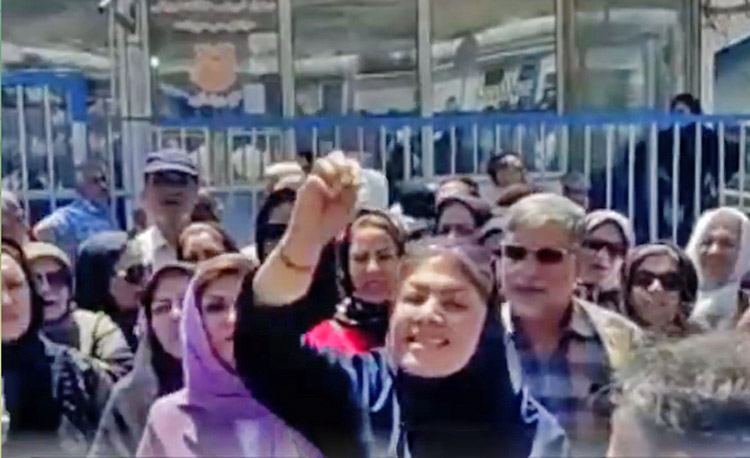Contract oil workers in Iran who made gains in a strike at over 100 worksites in April and May say they are now in a better position to prepare for future labor battles.
Led by the Organizing Council of Oil Contract Workers, the strikers demanded a 79% wage increase and a more humane work cycle of 20 days on and 10 days off instead of a grueling 24 days in a row with only six days off.
The overwhelming majority of the some 1 million workers in the oil industry in Iran are hired through contractors. Many are welders, scaffolders and pipefitters who help construct and repair oil facilities. Their jobs often last just six months or a year followed by months of unemployment
“Our strike worried everyone,” one of the workers wrote in a column posted on the union’s internet page June 29, from what the union calls “mafia gangs” of contractors to the oil bosses and the government.
One of the biggest contractors is Khatam-al Anbiya, which is owned by the Islamic Revolutionary Guard Corps, the main repressive force of the bourgeois clerical regime and one of the country’s largest business owners in Iran.
Contract workers say their conditions at times are “unbearable,” getting worse food and housing than the permanent oil workers. They are often paid late or the contractors pay them less than the wage agreed to by the oil companies, with the contractors pocketing the difference.
On June 19 the union noted that documents leaked that week from the Ministry of Intelligence admitted that at the high point of the strikes “more than 12,000 workers were on strike in the South Pars region alone.”
Sakhawat Asadi, the chief executive officer of the government’s Pars Special Economic Energy Zone, threatened to fire 4,000 of the strikers if they didn’t return to work. “Only about 300 people returned to work,” the union said.
Support for the strike was so strong that the Iranian Labour News Agency, which is affiliated to the government-funded Workers House, published an article titled “Protest against the arrest of eight South Pars workers. Hear the voice of the contract workers.”
By the end of May many contractors “agreed to a 30% wage increase, even 40%,” the union reported, and in many cases agreed to the more humane work schedule.
“By relying on this success and obvious weakness of the government in front of the united ranks of us workers, we can pursue our unmet demands with greater strength and unity,” the union said. That includes demanding the abolition of the contractor system itself.
Women’s rights are workers’ rights
On June 26 the oil contract workers union came out “firmly in support of art students and other university students who are protesting against the imposition of hijab. … From our point of view, women and all people have the right to choose their clothing. It is a simple and obvious right.”
That was in response to arrests and beatings by plainclothes thugs of students at the University of Tehran art school. They had organized a sit-in protesting new university rules imposing not just a hijab to cover women’s hair but the even more restrictive “maqna’a” that covers the head, neck and shoulders. University student groups across the country issued statements in solidarity with the art students.
In the wake of widespread protests over the death of a young Kurdish woman, Zhina Amini, after her arrest by the hated morality police in Tehran in September, the government pulled the morality police off the streets. The reactionary government hasn’t yet been able to pass its revised hijab law, introduced in March, which calls for text message warnings to those identified by security cameras as violating the reactionary dress code to be followed by fines, but would ban physical violence to enforce the rules.
Meanwhile, Iran’s national soccer federation announced June 30 that the National Security Council and Ministry of Interior had given the green light to women to go to sports stadiums to watch Premier League soccer games — starting with four locations — for the first time since a ban on women was reimposed in March 2022.
Amid the deepening capitalist economic crisis that includes 60% annual inflation, retirees protest daily demanding adequate pensions. There also have been strikes by factory workers, nurses and others.
On June 30 retirees and workers gathered in front of the entrance to the Sarcheshmeh complex in Kerman province — the second largest open pit copper mine in the world — protesting the transferring of their pensions funds to the Ministry of Welfare. In a video a woman is applauded by the crowd when she says that unless the government rescinds the decision, “We are not going to stop blocking the gate.”


